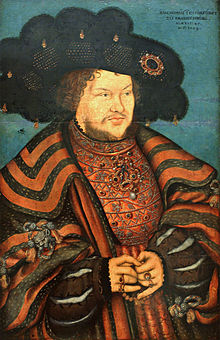Dessau Federation


The Dessauer Bund (also Dessauer Bündnis ) was a short-lived association of Catholic sovereigns in northern Germany during the time of the German Reformation , which was committed to fighting both insurrections and spreading the teachings of Martin Luther . The union was concluded on July 19, 1525 in Dessau .
The hostess was the strictly Catholic princess widow and regent Margarethe von Münsterberg .
backgrounds
The merger came about a few weeks after the battle of Frankenhausen in Thuringia , in which rebellious peasants were fought down. Energetic action against the influx of Protestantism seemed advisable to the Catholic rulers. Although Luther was personally very friendly, the princess feared a repetition of the peasant uprisings in her own country, which is why, contrary to the position of her own sons, she convened this covenant.
The Catholic Dessau Federation was limited to the Principality of Anhalt-Dessau within Anhalt , whereas the neighboring principalities of Anhalt-Köthen and Anhalt-Bernburg had already introduced the Reformation in 1525–1526 as the second and third countries in the world (after the process of Kursachsen). It was not until some time after the death of the Dessau princess (1530) that Anhalt-Dessau also ran under her son Georg III. (Anhalt-Dessau) started the Reformation in 1534.
consequences
The princes, who already adhered to the Protestant faith, reacted to the newly created situation with the Torgau Bund .
However, the Dessau Confederation was unable to have any major impact. It was no longer possible to motivate the Catholic princes in the south of the Holy Roman Empire to join. At the Diet in Speyer in 1526 , the supporters of both Christian faiths tried to reach a political understanding through compromise. The Edict of Worms was repealed. The Reichs Farewell contained the toleration of the new religion up to a council .
Members
This covenant of old-believing princes included:
- Duke George of Saxony
- Brandenburg Elector Joachim I. Nestor
- Archbishop Albrecht of Mainz and Magdeburg
- Erich I of Calenberg-Göttingen , Duke of Braunschweig-Lüneburg
- Duke Heinrich II of Braunschweig-Wolfenbüttel .
Web links
- Article at historicum.net
